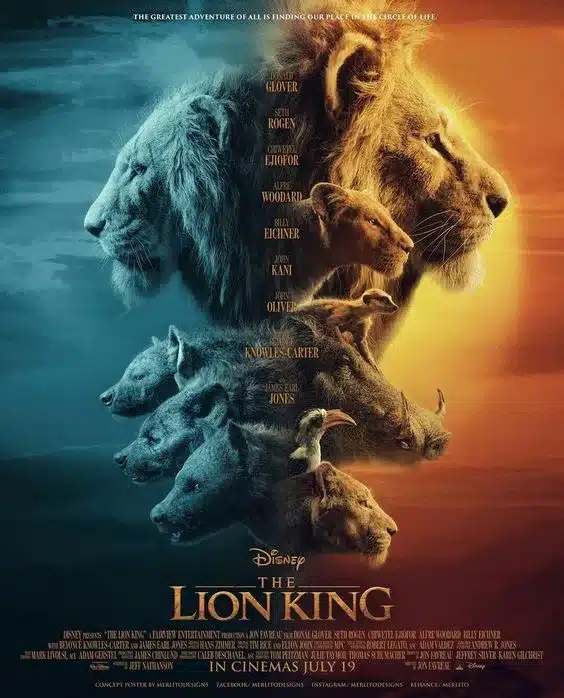THE LION KING.
Introduction: The Lion King, a cinematic masterpiece released in 1994, remains an iconic animated film that has stood the test of time. Inspired by William Shakespeare’s Hamlet and infused with elements from biblical stories, the movie tells a gripping coming-of-age drama set against the majestic backdrop of the African savannah. This article delves into the film’s journey from conception to production, highlighting its unique development process, outstanding voice cast, and the enduring impact it has had on popular culture.
The Evolution of The Lion King: Initially conceived as a non-musical documentary-style film, The Lion King underwent significant creative transformations during its development. Directors Roger Allers and Rob Minkoff, along with a team of talented writers, faced challenges and disagreements that ultimately led to the decision to turn the film into a musical. The departure of the initial director, George Scribner, marked a pivotal moment, with Minkoff stepping in to collaborate with Allers. This shift in direction paved the way for the film’s remarkable musical elements and emotional depth.
Casting and Character Development: The voice cast of The Lion King played a crucial role in bringing the characters to life. James Earl Jones, known for his powerful voice, portrayed Mufasa, while Matthew Broderick and Moira Kelly breathed life into the central characters of Simba and Nala. The unexpected casting of Nathan Lane and Ernie Sabella as Timon and Pumbaa, initially considered for other roles, added a delightful dynamic to the film. The collaboration of this diverse and talented cast contributed to the film’s success.
Animation Innovation: The Lion King pushed the boundaries of animation, combining traditional hand-drawn techniques with innovative computer-generated imagery. Animators studied real-life animals to capture authentic movements, and the use of 3D computer programs in the wildebeest stampede sequence showcased the film’s technological advancements. The film’s visual grandeur drew inspiration from various sources, including paintings by Charles Marion Russell and the works of acclaimed filmmakers like John Ford.
Musical Mastery: The Lion King’s soundtrack, a collaboration between lyricist Tim Rice and music icon Elton John, became a cultural phenomenon. Songs like “Circle of Life,” “Hakuna Matata,” and “Can You Feel the Love Tonight” not only captivated younger audiences but also resonated with adults. Composer Hans Zimmer’s score, complemented by traditional African music, added a rich layer to the film’s emotional tapestry. The soundtrack’s enduring popularity is evident in its Diamond certification by the RIAA.
Impact and Legacy: Upon its release, The Lion King garnered critical acclaim and commercial success, becoming the highest-grossing animated film of its time. Beyond its box office triumph, the film’s influence extended to various derived works, including a successful Broadway adaptation and a photorealistic remake in 2019. The Lion King’s cultural significance was recognized when it was selected for preservation in the U.S. National Film Registry in 2016, underscoring its enduring impact on cinema.
Conclusion: The Lion King remains a cinematic gem that transcends generations, offering a timeless narrative of love, loss, and redemption. Its unique blend of captivating storytelling, memorable characters, and groundbreaking animation techniques has solidified its place as one of the greatest animated films in history. As audiences continue to be enthralled by the Circle of Life, The Lion King’s roar echoes through the annals of cinematic excellence.
Release:
Theatrical Release: “The Lion King” had a limited release in the United States on June 15, 1994. It played in only two theaters, the El Capitan Theatre in Los Angeles and Radio City Music Hall in New York City. The limited release featured live shows with ticket prices up to $30. The wide release followed on June 24, 1994, across 2,550 screens. The film’s digital surround sound prompted many theaters to implement Dolby Laboratories’ newest sound systems.
Localization: Upon its initial release in 1994, “The Lion King” was localized into 28 versions worldwide, encompassing various languages and dialects. Notably, a special Zulu version was created for South Africa, featuring Zulu voice actors. This Zulu dubbing is the only one made by Disney in any African language other than Arabic. Over the years, more language adaptations were produced, reaching a total of 45 by 2022. The Zulu dubbing became available on Disney+ in October 2022.
In 2021, following the success of the Māori dub of “Moana,” a Māori version of “The Lion King” was announced and released theatrically on June 23, 2022, aligning with the Māori holiday of Matariki. This adaptation marked the first time Elton John’s “Can You Feel the Love Tonight” was translated for the ending credits in a language adaptation.
Re-releases:
IMAX and Large-Format: The film was re-issued on December 25, 2002, for IMAX and large-format theaters. This re-release aimed to introduce the classic to a new generation of children who hadn’t seen it on the big screen. The restoration process was facilitated by the film’s digital archiving during production, allowing for enhancements to cover original deficiencies. The Lion King made $2.7 million on its first weekend from 66 locations and ended with $15.7 million on May 30, 2003.
3D Conversion: In 2011, “The Lion King” underwent a 3D conversion for a two-week limited theatrical re-issue and subsequent 3D Blu-ray release. The 3D re-release achieved box office success, earning the number-one slot at the American weekend box office during its opening weekend. The film maintained its popularity during subsequent weekends, grossing $94.2 million in North America and $83.4 million outside North America.
Disney100: As part of Disney’s 100th anniversary, “The Lion King” was re-released between September 29 to October 12, 2023, in selected Cinemark theaters across the United States and Helios theaters across Poland on October 8.
Home Media:
“The Lion King” was first released on VHS and LaserDisc on March 3, 1995, under Disney’s “Masterpiece Collection” video series. The VHS edition quickly became the best-selling videotape of all time, selling 4.5 million tapes on the first day. In total, VHS releases sold 32 million units in North America, grossing $520 million in sales revenue.
On October 7, 2003, the film was re-released on VHS and DVD as “The Lion King: Platinum Edition.” The DVD release featured two versions of the film and included bonus features. The Platinum Edition DVD and VHS units sold over two million copies on the first day of release.
The Diamond Edition of “The Lion King” was released on October 4, 2011, on high-definition Blu-ray and Blu-ray 3D. The initial release included different packages with varying disc counts, including a standalone single-disc DVD release on November 15, 2011. The Diamond Edition topped Blu-ray charts, selling over 1.5 million copies.
The film was part of the Walt Disney Signature Collection, released on Digital HD on August 15, 2017, and on Blu-ray and DVD on August 29, 2017. It was also released on Ultra HD Blu-ray and 4K digital download on December 3, 2018.
Reception:
Box Office: “The Lion King” grossed $422.8 million in North America and $545.7 million in other territories, totaling $968.5 million worldwide. Initially, it ranked as the highest-grossing animated film of all time, the highest-grossing film of Walt Disney Animation Studios, and the highest-grossing film of 1994. It held the record for the second-highest-grossing film of all time until it was surpassed by “Independence Day” in 1996.
It was the highest-grossing G-rated film in the United States from 1994 to 2003 and again from 2011 to 2019. The film sold over 74 million tickets in the US during its initial theatrical run.
Critical Response: Critical reception for “The Lion King” has been overwhelmingly positive. On Rotten Tomatoes, it holds an approval rating of 93%, with an average score of 8.4/10, based on 137 reviews. The critical consensus describes it as emotionally stirring, richly drawn, and beautifully animated. At Metacritic, the film received a score of 88 out of 100, indicating universal acclaim. Audiences polled by CinemaScore gave the film a rare “A+” grade on an A+ to F scale.
Critics praised the film’s animation, emotional depth, and musical score, with Roger Ebert calling it a superbly drawn animated feature. It received numerous awards, including Academy Awards for Best Original Score and Best Original Song for “Can You Feel the Love Tonight.” The film’s impact is also evident in its induction into the National Film Registry.
Other Honors:
- In 2008, The Lion King was ranked as the 319th greatest film ever made by Empire magazine.
- In June 2011, TIME named it one of “The 25 All-TIME Best Animated Films.”
- In June 2008, the American Film Institute listed The Lion King as the fourth-best film in the animation genre in its AFI’s 10 Top 10 list.
- The film was nominated for AFI’s 100 Years…100 Cheers list of most inspiring movies.
- In 2016, The Lion King was selected for preservation in the United States National Film Registry by the Library of Congress as being “culturally, historically, or aesthetically significant.”
Year-end Lists:
- Various year-end lists ranked The Lion King, with mentions in publications like The Milwaukee Journal, The Oklahoman, Miami New Times, and more.
Controversies:
- There were protests against a scene where it appeared as if the word “SEX” might have been embedded in the dust flying in the sky. Animator Tom Sito clarified that the letters spell “SFX,” a common abbreviation for “special effects.”
- Hyena biologists protested against the portrayal of hyenas in the film, though some of the complaints were tongue-in-cheek.
- The film faced criticism for race and class issues, with the hyenas seen as reflecting negative stereotypes of black and Latino ethnic communities.
- There were claims of resemblance to Osamu Tezuka’s Japanese anime series, Jungle Emperor (Kimba the White Lion), leading to protests in Japan and accusations of plagiarism. However, the directors claimed unfamiliarity with the series.
Legacy:
- The Lion King franchise includes sequels, spin-offs, and a CGI remake.
- The first Lion King-related animated project was the spin-off TV series, The Lion King’s Timon & Pumbaa.
- Two direct-to-video films related to The Lion King were released: The Lion King II: Simba’s Pride (1998) and The Lion King 1½ (2004).
- A TV series called The Lion Guard, featuring Simba’s second-born cub Kion, was released in 2015.
- A CGI remake of The Lion King was released in 2019, directed by Jon Favreau, featuring a star-studded cast including Donald Glover, Beyoncé, and others.
Additional Information:
Film Release:
- Production for the film began in May 2017.
- The Lion King (2019) was released on July 19, 2019.
Black Is King:
- In June 2020, Parkwood Entertainment and Disney announced the release of “Black Is King” on July 31, 2020, on Disney+.
- The film, inspired by The Lion King (2019), serves as a visual album for the tie-in album “The Lion King: The Gift,” curated by Beyoncé.
- Directed, written, and executive produced by Beyoncé, “Black Is King” reimagines “the lessons of The Lion King for today’s young kings and queens in search of their own crowns.”
- The cast includes Lupita Nyong’o, Naomi Campbell, Jay-Z, Kelly Rowland, Pharrell Williams, Tina Knowles-Lawson, Aweng Ade-Chuol, and Adut Akech.
Mufasa: The Lion King:
- On September 29, 2020, Deadline Hollywood reported that a follow-up film, “Mufasa: The Lion King,” was in development with Barry Jenkins attached to direct.
- The film is reported to be either a prequel about Mufasa during his formative years or a sequel centering on both Mufasa’s origins and the events after the first film.
- Aaron Pierre and Kelvin Harrison Jr. were cast as Mufasa and Scar, respectively.
- The film will not be a remake of The Lion King II: Simba’s Pride and is scheduled for release on December 20, 2024.
Video Games:
- Three video games based on The Lion King were released by Virgin Interactive in December 1994.
- “The Lion King: Simba’s Mighty Adventure” (2000) for the Game Boy Color and PlayStation is a game inspired by the film and its sequel.
- Timon and Pumbaa appeared in “Timon & Pumbaa’s Jungle Games” (1995) and the video game “Disney Magic Kingdoms” features characters and attractions from the film.
Stage Adaptations:
- Walt Disney Theatrical produced a musical stage adaptation of The Lion King, which premiered in Minneapolis, Minnesota in July 1997 and opened on Broadway in October 1997.
- The musical features songs from the movie and Rhythm of the Pride Lands, along with three new compositions by Elton John and Tim Rice.
- The Lion King musical became one of the most successful in Broadway history, winning six Tony Awards, including Best Musical.
Attractions:
- Two attractions retelling the story of The Lion King were created at Walt Disney Parks and Resorts, including “The Legend of the Lion King” and “Festival of the Lion King.”
See Also:
- The article ends with a section mentioning cultural depictions of lions and a reference to a controversy related to Atlantis: The Lost Empire and Nadia: The Secret of Blue Water.
- Book Reference:
- Olson, Scott Robert (1999). Hollywood planet: global media and the competitive advantage of narrative transparency. Taylor & Francis. p. 216. ISBN 978-0-8058-3230-3.
- Article References:
- Broeske, Pat H. (June 23, 1995). “Playing for Keeps”. Entertainment Weekly. Archived from the original on February 24, 2015.
- Bryman, Alan (2004). The Disneyization of Society. Sage. p. 86. ISBN 978-0-7619-6765-1.
- Eller, Claudia (April 7, 1994). “Summer Movie Hype Coming In Like a ‘Lion'”. Los Angeles Times. Archived from the original on March 5, 2016.
- “Mane Event”. Variety. June 20, 1994.
- Fantel, Hans (June 12, 1994). “Technology; Cinema Sound Gets a Digital Life”. The New York Times. Archived from the original on March 9, 2014.
- Online Article References:
- “Nala”. CHARGUIGOU (in French). Archived from the original on July 25, 2019.
- “Inkosi Ubhubesi / The Lion King Zulu Voice Cast”. WILLDUBGURU. Archived from the original on October 14, 2019.
- “‘Moana’ to be First Disney Film Translated Into Tahitian Language”. Entertainment Weekly. Archived from the original on July 20, 2019.
- News References:
- “Moana in Māori hits the big screen”. RNZ. September 11, 2017.
- “Disney’s Moana to make World Premiere in ‘Ōlelo Hawai’i at Ko Olina’s World Oceans Day, June 10”. Ko Olina.
- “Frozen 2′ Will Get Sámi Language Version”. Animation Magazine. July 19, 2019.
- “How The Lion King Reo Māori did what no other version has done before”. The Spinoff. June 23, 2022.
- Movie References:
- “Releases for The Lion King (1994)”. Box Office Mojo. Archived from the original on April 6, 2014.
- “Audiences to Experience Disney’s “The Lion King” Like Never Before”. PR News Wire. May 26, 2011.
- “Disney’s ‘The Lion King’ to Return to Theaters in Digital 3D”. The Hollywood Reporter. May 26, 2011.
- Home Video References:
- Brown, Laura (March 11, 1995). “Growling at ‘The Lion King’ Video”. Los Angeles Times.
- “The Lion King home video selling figures”. ComingSoon.Net. October 9, 2003.
- “TLK on Home Video”. Lionking.org.
- Grover, Ronald (February 16, 1998). “The Entertainment Glut”. Bloomberg Businessweek.
- Box Office References:
- “‘Forrest Gump’ Off to Fast Start at Box Office”. Los Angeles Times. July 8, 1994.
- “Top 50 movies of 1994”. Movies.com.
- “The Lion King (1994)”. Box Office Mojo.
- Film Reviews:
- Hinson, Hal (June 24, 1994). “The Lion King review”. The Washington Post.
- Gleiberman, Owen (June 24, 1994). “The Lion King movie review”. Entertainment Weekly.
- Travers, Peter (July 14, 1994). “The Lion King movie review”. Rolling Stone.
Share this content:



Post Comment